

Does loneliness weaken the immune system? Yes, it often builds stress - Insider. Loneliness is associated with chronic stress and inflammation, which can weaken your immune system.
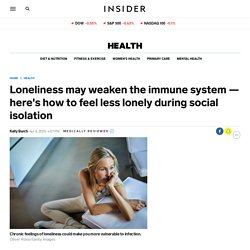
Research has found that it's your perception of loneliness — not an objective measure of social isolation — that is associated with negative health outcomes. Even if you are socially isolated, there are ways to feel less lonely, such as talking to loved ones and connecting through virtual activities. This article was medically reviewed by Julia Blank, MD, family medicine physician at Providence Saint John's Health Center. Visit Insider's homepage for more stories. More than 85% of Americans have been ordered to stay home in hopes of minimizing the spread of coronavirus.
If you're feeling alone and feeling sick, the two may be more connected than you think. Chronic loneliness may weaken the immune system Loneliness can make your immune system less robust, says Soma Mandal, MD, an internist. "People who are lonelier tend to have more stress," she says. The risks of social isolation. Overview CE credits: 1 Learning objectives: After reading this article, CE candidates will be able to: Identify the effects of social isolation and loneliness on physical, mental and cognitive health.Explore how loneliness differs from social isolation.Discuss evidence-based interventions for combating loneliness.
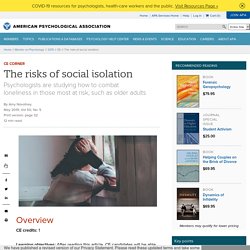
For more information on earning CE credit for this article, go to www.apa.org/ed/ce/resources/ce-corner.aspx. According to a 2018 national survey by Cigna, loneliness levels have reached an all-time high, with nearly half of 20,000 U.S. adults reporting they sometimes or always feel alone. Such numbers are alarming because of the health and mental health risks associated with loneliness. "There is robust evidence that social isolation and loneliness significantly increase risk for premature mortality, and the magnitude of the risk exceeds that of many leading health indicators," HoltLunstad says. Who is most likely? How it affects the elderly's development. Health Effects of Social Isolation and Loneliness – Aging Life Care Association™
Clifford Singer, MD Adjunct Professor, University of Maine Chief, Geriatric Mental Health and Neuropsychiatry Acadia Hospital and Eastern Maine Medical Center 268 Stillwater Avenue Bangor Maine 04402 207.973.6179 csinger@emhs.org Cliff Singer is a geriatrician and psychiatrist.
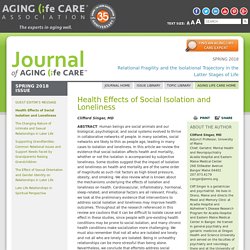
He lives in Orono, Maine and directs the Mood and Memory Clinic at Acadia Hospital and Alzheimer’s Disease Research Program for Acadia Hospital and Eastern Maine Medical Center in Bangor. He trained in general psychiatry and geriatric medicine at Oregon Health and Science University and served on the faculties of psychiatry and neurology there and at the University of Vermont before moving to Maine in 2010. Clifford Singer, MD ABSTRACT: Human beings are social animals and our biological, psychological, and social systems evolved to thrive in collaborative networks of people. One in Three Seniors Is Lonely. Here's How It’s Hurting Their Health.
How it affects the elderly's development. The loneliness of social isolation can affect your brain and raise dementia risk in older adults. Physical pain is unpleasant, yet it’s vital for survival because it’s a warning that your body is in danger.
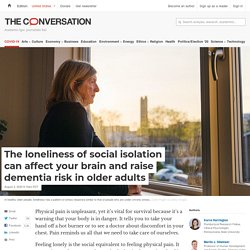
It tells you to take your hand off a hot burner or to see a doctor about discomfort in your chest. Pain reminds us all that we need to take care of ourselves. Feeling lonely is the social equivalent to feeling physical pain. It even triggers the same pathways in the brain that are involved in processing emotional responses to physical pain. Just like feeling physical pain, feeling lonely and disconnected from others is also a signal that we need to take care of ourselves by seeking the safety and comfort of companionship.
As scholars at the Center for Healthy Aging at Penn State, we study the impact of stress on the aging body and brain, including how it can worsen cognitive decline and risk for dementia. The health consequences of loneliness The COVID-19 pandemic has put many older adults’ social lives on hold, leaving them at greater risk for loneliness. Social isolation worsens the effects of Alzheimer's disease, study shows. Reviewed by Emily Henderson, B.Sc.Oct 1 2020 A study in mice conducted by the UAB shows that social isolation worsens the effects of Alzheimer's disease, with hyperactivity levels reaching up to twice as much as in the pathology itself.
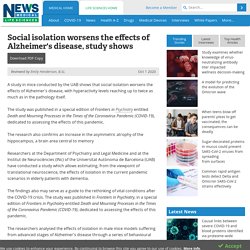
The study was published in a special edition of Frontiers in Psychiatry entitled Death and Mourning Processes in the Times of the Coronavirus Pandemic (COVID-19), dedicated to assessing the effects of this pandemic. The research also confirms an increase in the asymmetric atrophy of the hippocampus, a brain area central to memory Researchers at the Department of Psychiatry and Legal Medicine and at the Institut de Neurociències (INc) of the Universitat Autònoma de Barcelona (UAB) have conducted a study which allows estimating, from the viewpoint of translational neuroscience, the effects of isolation in the current pandemic scenarios in elderly patients with dementia. Effects of isolation on memory Rethinking isolation among the elderly Source: How it affects the elderly's development.